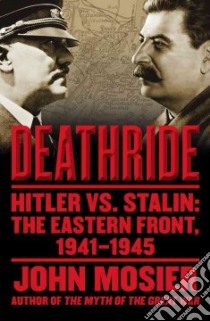- Libreria
- >
- Libri in lingua
- >
- Storia e archeologia
- >
- Storia
Deathride - 9781416573487
Un libro in lingua di John Mosier edito da Simon & Schuster, 2010
- € 26.70
- Il prezzo è variabile in funzione del cambio della valuta d’origine
"Mosier's reassessment of the war and how it was won marshals some strong evidence and is solidly argued. And it will no doubt have historians up in arms for years to come."---The Washington Post Book World
"This provocative book tosses military-history hand grenades on almost every page, challenging just about every generally held notion about World War II. Even if you take issue with some of Mosier's interpretations, you'll find this a superb read."---Steve Forbes, Forbes
"Students of military history love to argue, and John Mosier gives them much to argue about. From armaments and tactics to strategy and politics, he challenges conventional wisdom and forces a rethinking of the war that inaugurated the modern era."---H. W. Brands, author of The First American and TR: The Last Romantic
"There is much in the work I really admire, not least its brilliant recasting of the traditional military narrative." ---Niall Ferguson
"The author knows his military history, strategy, and tactics packed with evidence, much of it ingeniously obtained and argued." --- The Washington Post
"An important, superbly researched reappraisal of the fabled Wehrmacht in both World Wars. Those who believe that we have learned everything there is to know about World War II will view the legendary German war machine and its history in an entirely new light after reading this provocative book."---Carlo D'Este, author of Eisenhower: A Soldier's Life and Patton: A Genius for War
The German invasion of the Soviet Union on June 22, 1941, began a war that lasted nearly four years and created by far the bloodiest theater in World War II. In the conventional narrative of this war, Hitler was defeated by Stalin because, like Napoleon, he underestimated the size and resources of his enemy. In fact, says historian John Mosier, Hitler came very close to winning and lost only because of the intervention of the Western Allies. Stalin's great triumph was not winning the war, but establishing the prevailing interpretation of the war. The Great Patriotic War, as it is known in Russia, would eventually prove fatal, setting in motion events that would culminate in the collapse of the Soviet Union.
Deathride argues that the Soviet losses in World War II were unsustainable and would eventually have led to defeat. The Soviet Union had only twice the population of Germany at the time, but it was suffering a casualty rate more than two and a half times the German rate. Because Stalin had a notorious habit of imprisoning or killing anyone who brought him bad news (and often their families as well), Soviet battlefield reports were fantasies, and the battle plans Soviet generals developed seldom responded to actual circumstances. In this respect the Soviets waged war as they did everything else: through propaganda rather than actual achievement. What saved Stalin was the Allied decision to open the Mediterranean theater. Once the Allies threatened Italy, Hitler was forced to withdraw his best troops from the eastern front and redeploy them. In addition, the Allies provided heavy vehicles that the Soviets desperately needed and were unable to manufacture themselves. It was not the resources of the Soviet Union that defeated Hitler but the resources of the West.
In this provocative revisionist analysis of the war between Hitler and Stalin, Mosier provides a dramatic, vigorous narrative of events as he shows how most previous histories accepted Stalin's lies and distortions to produce a false sense of Soviet triumph. Deathride is the real story of the Eastern Front, fresh and different from what we thought we knew.
Informazioni bibliografiche
- Titolo del Libro in lingua: Deathride
- Sottotitolo: Hitler vs. Stalin : The Eastern Front, 1941-1945
- Lingua: English
- Autore: John Mosier
- Editore: Simon & Schuster
- Collana: Simon & Schuster (Hardcover)
- Data di Pubblicazione: 15 Giugno '10
- Genere: HISTORY
- Argomenti : World War, 1939-1945 Campaigns Eastern Front World War, 1939-1945 Germany World War, 1939-1945 Soviet Union
- Pagine: 470
- ISBN-10: 1416573488
- EAN-13: 9781416573487


